WooCommerce – e-commerce platform in the form of a WordPress plugin


Table of Contents
- What is WooCommerce?
- The appearance of the shop or themes - what do you need to know about them?
- WooCommerce plugins - the basis for modifying your shop
- SEO in WooCommerce
- WooCommerce SEO for social media
- Weak points of WooCommerce – when is it better to choose a different CMS?
- Advantages of WooCommerce – why choose WooCommerce?
- Summary: is it worth considering WooCommerce?
What is WooCommerce?
Before we introduce how WooCommerce works, it's worth mentioning WordPress. The previously-mentioned WordPress is a content management system, which at the beginning was mainly focused on blogs and websites, but thanks to the possibility of extending it with plugins, it is possible to develop an e-shop using with this system.

Source: WooCommerce Logo.
WooCommerce can be used as an add-on to a website, blog or as a standalone shop, depending on the configuration. Launching an e-shop based on WooCommerce and WordPress is free, but you have to take into account the costs of maintaining the domain, hosting, theme purchase and possible programming work. The script is translated into Polish so there is no problem with opening a WooCommerce-based shop in this country. Polish payment gateways and carriers have developed their own dedicated plugins. Besides handling orders and customer services, the basic features include:
- Sales, customer and stock reports,
- Key warehouse management,
- Coupon system,
- Overview of general status, logs, planned actions,
- REST API.
The basic range of features is quite limited, but it makes WooCommerce a good foundation for more advanced projects thanks to plug-in extensions.
The appearance of the shop or themes - what do you need to know about them?
In order for the shop to look attractive and to have the minimum of features that are needed to conduct sales, it is worth investing in a good theme. It can be either your own solution or one that was bought in a popular add-on shop. So what should you look for when buying a theme? The basic aspects to consider when purchasing a theme are as follows:
- Responsiveness (the shop is properly scaled for mobile devices and desktops),
- Speed and optimisation possibilities,
- The rating (and number) of users who purchased the theme,
- Popularity,
- Update frequency,
- Technical support,
- Additional plugins,
- Compatibility with SEO plugins.

Source: WooCommerce configurator - theme selection.
WooCommerce plugins - the basis for modifying your shop
The choice of plugins depends largely on the preferences and needs of a given project. The most basic plugins are those that will allow you to support Polish payment gateways and Polish carriers. Another important issue is the management of goods both in terms of the internal side - mainly warehouse management - and on the outside, through various filters. Another important issue is to integrate it with the relevant analytical data, such as Google Analytics or Facebook Analytics. Additional plugins that may be useful include integrators with popular websites such as: Ceneo, Facebook, Allegro or Google Merchant Center. Other issues will also involve plugins supporting email/push notification marketing or AB tests. Furthermore, it is important to choose the proper SEO plugin that will share all important information with search engines, as well as help with the selection of keywords and analyse the website.
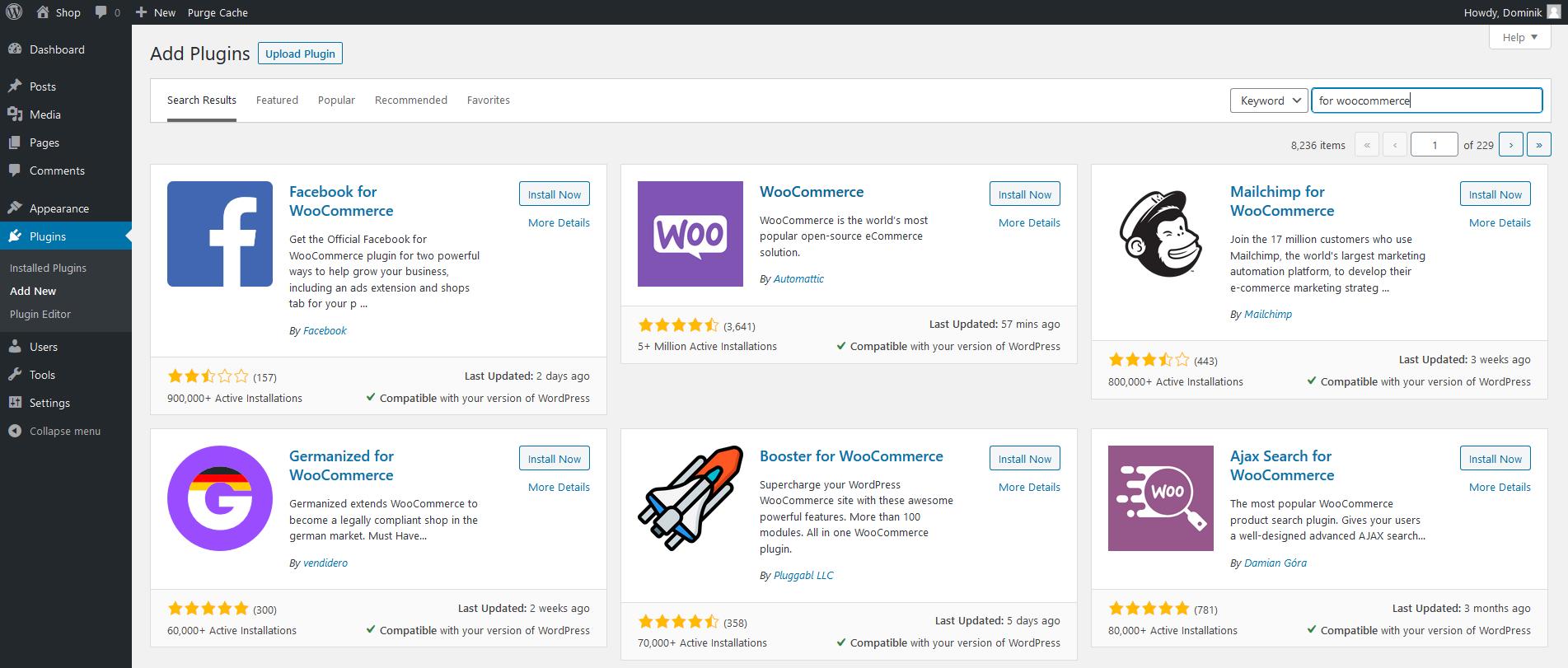
Source: Plugin search engine from the WordPress repository.
SEO in WooCommerce
If you deal with SEO, you certainly know well that the so-called in-site is important. The shop subpages must contain the appropriate metatags and structured data to appear in search results. In its basic version without any additional SEO plugins, WooCommerce does not support the most important metatags and structural data, site maps, or other useful data. The most common plugins that can be used for this purpose for WooCommerce are:
- YoastSEO,
- SEOPress,
- All In One SEO Pack.
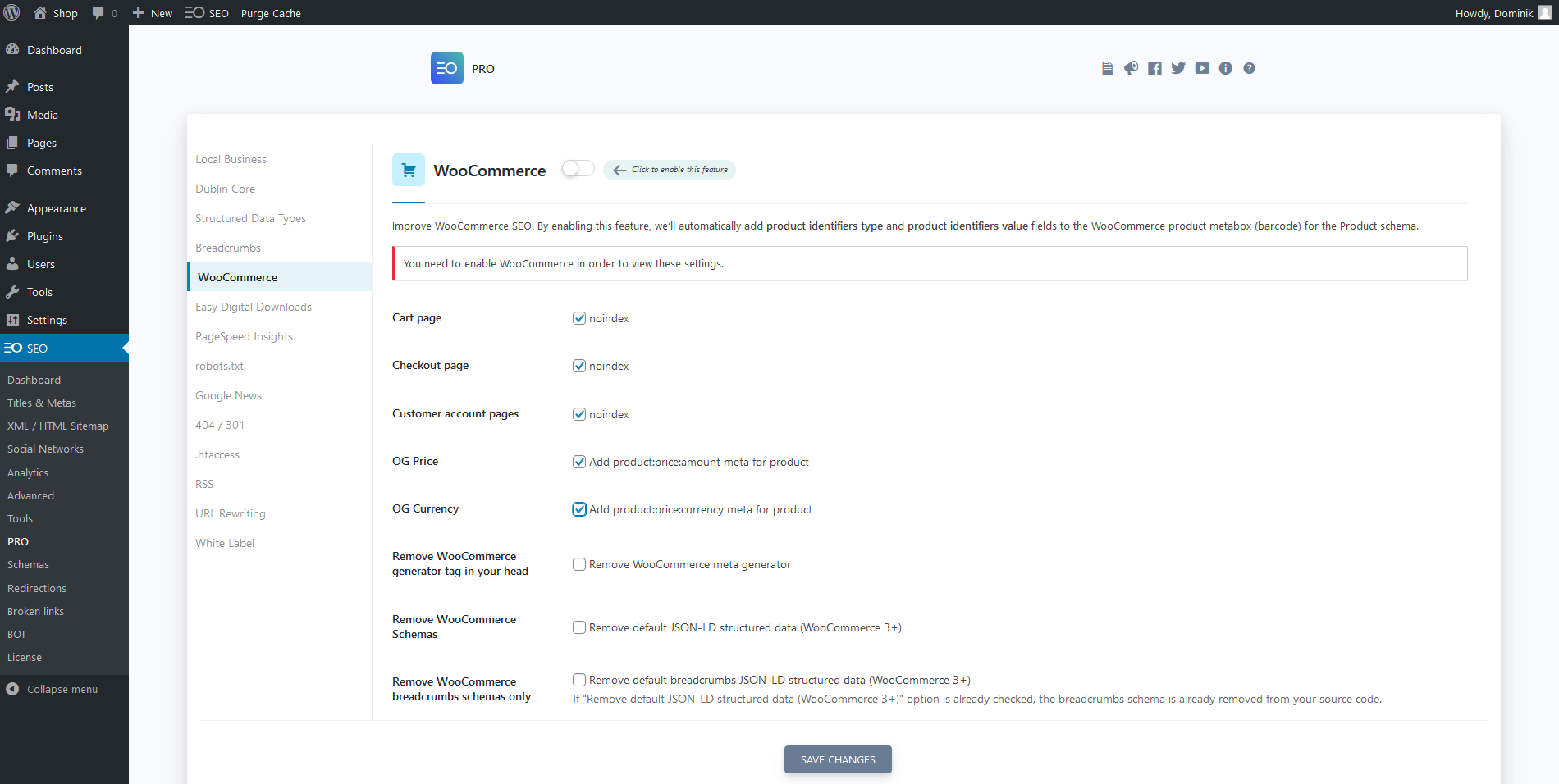
Source: SEO settings for WooCommerce in SeoPress.
The most basic features that are required from SEO plugins are the ability to add, edit and analyse data such as:
- Meta title - page title, which is shown as the header in the search results and in the browser window;
- Meta description - page description that is displayed in search engines and often in the page preview on third party pages;
- Meta robots - information only for the search engine about whether a given subpage is to be indexed;
- Canonical - both for category subpages and duplicates.
Schema.org data constitutes additional data, and above all, provides more information to the data search engine. When speaking of shops, in this case, it is worth looking at the following:
- Product - for basic product data and reviews,
- Local Business - when you also own a physical shop or a pick-up point,
- FAQ - for the most frequently asked questions by customers,
- Event - for events organised by the shop,
- Article - used in all kinds of blog entries on a shop blog.
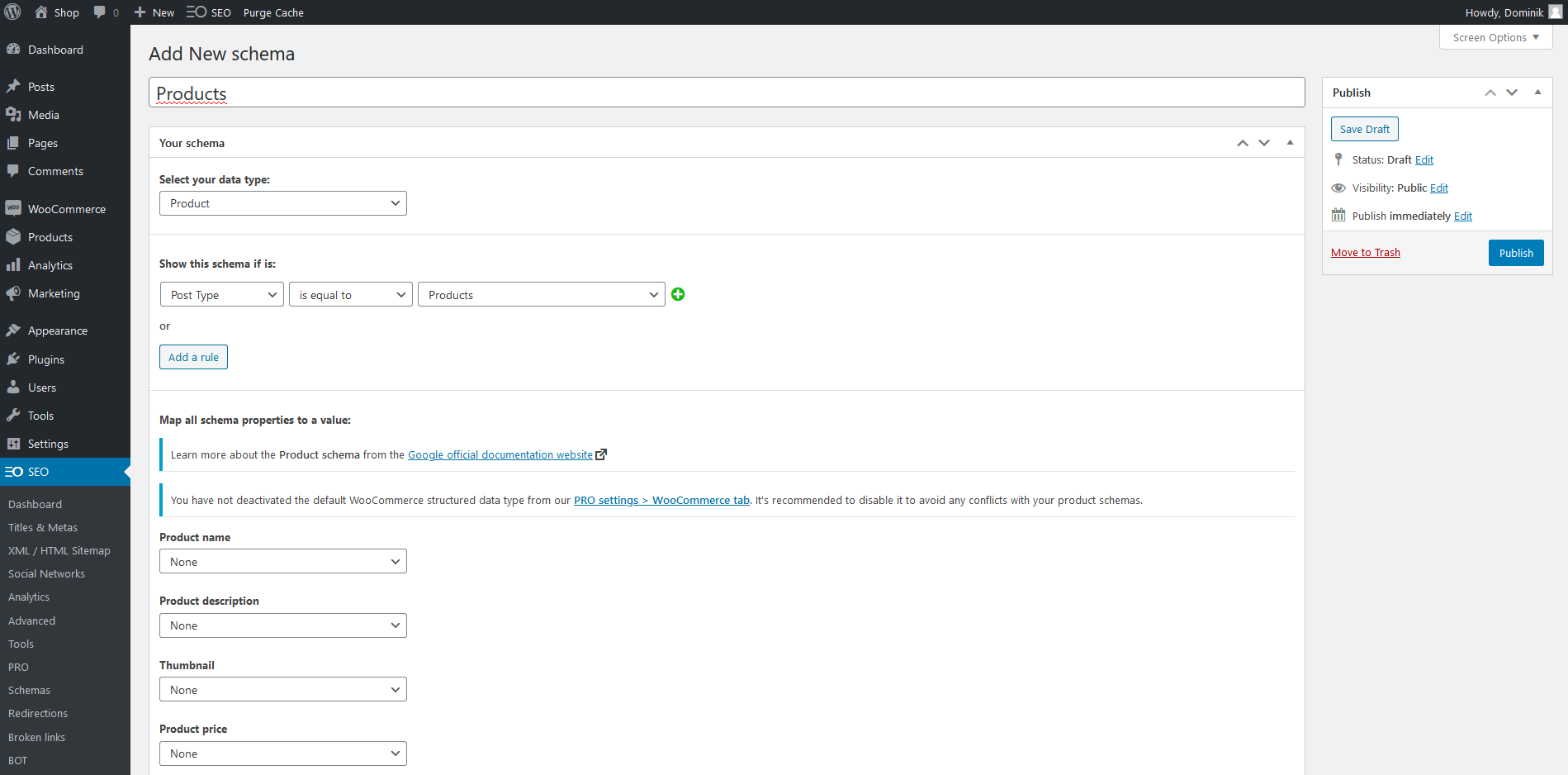
Source: Schema.org in SeoPress
Of course, the number of shops, the number of potential implementations. It is certainly worth providing as much schematic data as possible to the search engine, which can ultimately result in higher positions in SERPs thanks to the Google Knowledge Graph.
WooCommerce SEO for social media
Social media follow their own rules. It is worth providing data to them so that the website will be properly displayed in the preview for embedded links. Due to implementing Open Graph you will have control over the transfer of this information. The media that use OG include, among others:
Weak points of WooCommerce – when is it better to choose a different CMS?
Like any software, WooCommerce also has its downsides. It will not be good for every application, especially in its basic form. The main disadvantages of WooCommerce include:
- Technical support - as the case may be with open source software, errors can of course be reported to the developers, but support is not provided to the extent that is present with paid SAAS software. It is best to find a specialist who will handle the technical side of the shop;
- Implementation costs - depending on the project, you will need hosting, a theme and plugins that will provide basic functionality. If you don't have any skill in developing pages, a specialist may be helpful;
- The number of products and categories - in the case of a larger number of products and categories, managing them through the default WooCommerce interface may be problematic;
- Updates - you have to look after the security and updates of systems yourself. It often happens that a given theme or plugin is not compatible with the latest version of WooCommerce and then you have to find a solution;
- Optimisation - this is a topic that is not the simplest one, especially with large shops, and is related to the hosting you choose. It is important that the shop runs as quickly as possible for the customer and or the Google robot.
- Shipping costs - the default WooCommerce rules do not make it possible to set advanced rules for product dimensions;
- Issuing VAT invoices - this is a basic issue that is necessary when handling orders, and is not available in WooCommerce;
- No basic SEO optimisation - there are no good search engine optimisation possibilities in the basic version of WooCommerce You need to install a plugin, which will make it possible to change the settings of the key elements necessary for good visibility of the shop in SERPs.
- Few features compared to the competition - when you compare the core of WooCommerce itself, you will most certainly get have the impression that there are shortages compared to the competition such as Prestashop, Magento or paid SAAS.
- Free plugins, but quality varies - the repository of plugins for WordPress is full of free WooCommerce-related solutions. Unfortunately, plugins are the biggest security holes, authors unintentionally or intentionally implement bugs in their extensions;
- Free but paid plugins - plugins that are free often have a paid version that includes their key features. Often, if you are looking for a useful solution, you will be required to pay extra.
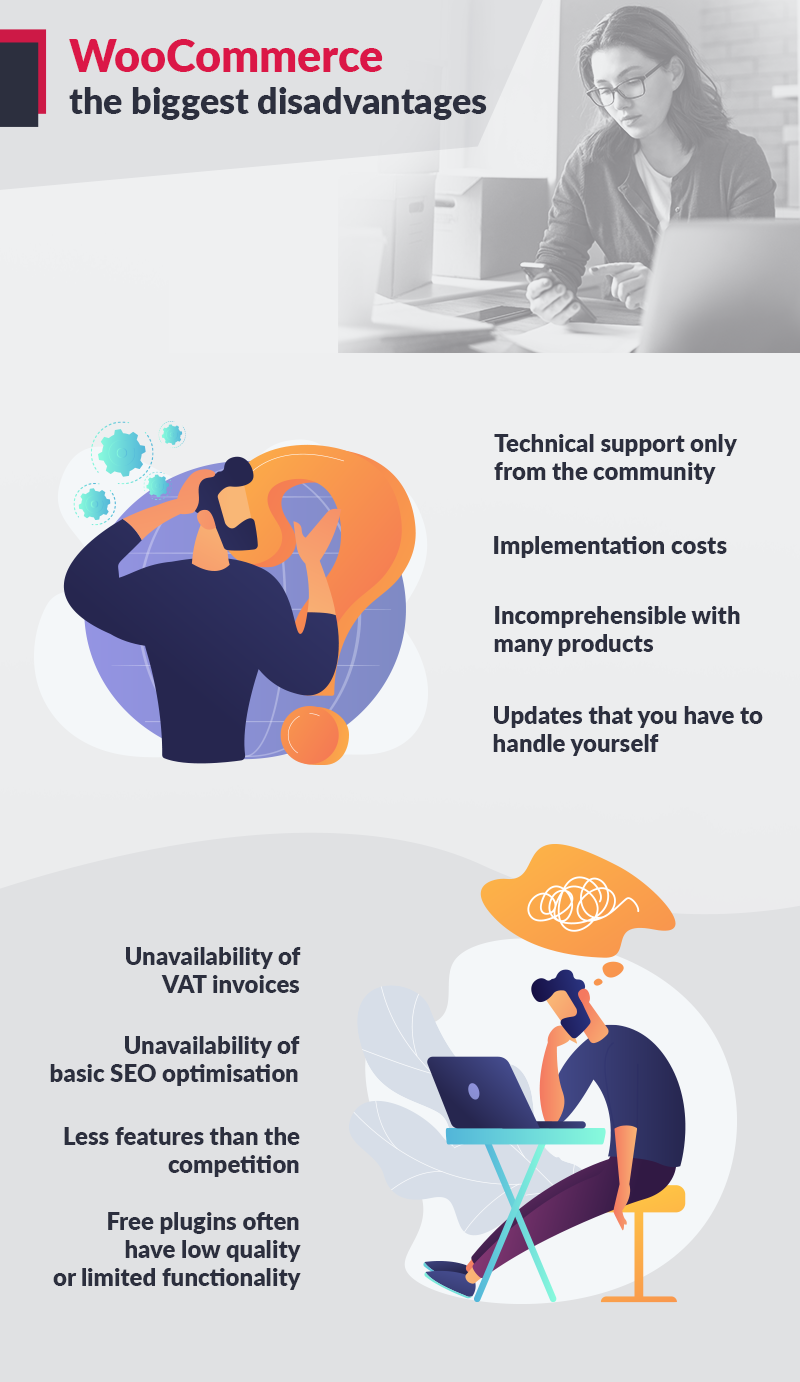
Source: WhitePress Graphics Development.
Advantages of WooCommerce – why choose WooCommerce?
Undoubtedly, apart from a large list of disadvantages, WooCommerce also has many advantages. This is evidenced by a large percentage of e-commerce market entities that use this script. The main advantages are:
- Price - WooCommerce plugin and WordPress CMS are completely free;
- Use simplicity - very simple interface that everyone will understand after a short training. If you have already used WordPress, WooCommerce won't be a problem;
- Many specialists - the shop engines based on open source software are characterised by the fact that any person with appropriate technical knowledge can start fixing bugs. For paid solutions, we must rely on the technical support of the given SAAS solution;
- Frequent updates - this is due to a large community. Each e-commerce system must be properly secured and frequently updated so that there are no leaks of any kind;
- A community of committed people - WordPress is the most popular CMS and the WooCommerce plugin is one of the most popular e-commerce engines in the world. The community is very keen on helping with software development and bug fixing;
- Integrated blog - WooCommerce bases its functionality on the WordPress blog CMS. A well-run blog is the basis for good visibility in search engines and contributes to a higher level of customer trust;
- Full personalisation scope - the owner has full control over all kinds of modifications related to the appearance and functionality. The core of WooCommerce functionality is the basis for further customisation possibilities of the shop;
- Multiplicity of plugins and themes available - the free WordPress repository as well as the paid collections are full of various types of solutions. You will certainly find something to match your needs, and if not, you can always look for a specialist who will implement the required features. In the case of a paid SAAS solution, it would involve a one-sided evaluation or refusal;
- Product version control - with each modification of the descriptions, it may happen that something goes wrong. WooCommerce provides the possibility of returning to the previous version or previewing an older version of the description;
- Statistics - you can import and analyse basic issues related to the functioning of the shop;
- SEO plugins - it's true that I have mentioned problems with a completely clean version of WooCommerce when referring to its disadvantages. It cannot be denied that the plugins related to SEO optimisation for WordPress (and thus for WooCommerce) are very comprehensive, they meet the needs of most e-shops.
- Two-step basket - very simple product ordering process. Additionally, buyers can order products without creating an account.
- Various types of products - There are many types of products in WooCommerce. From simple to virtual or affiliate products, moreover, each product can be grouped into different varieties;
- Developed by Automattic - WordPress developers are also WooCommerce developers. This is why the plugin design and development support process is parallel to the development of WordPress.
- Developer-friendly - it offers a number of simplifications left by developers to in order to grow WordPress, including WooCommerce REST API.
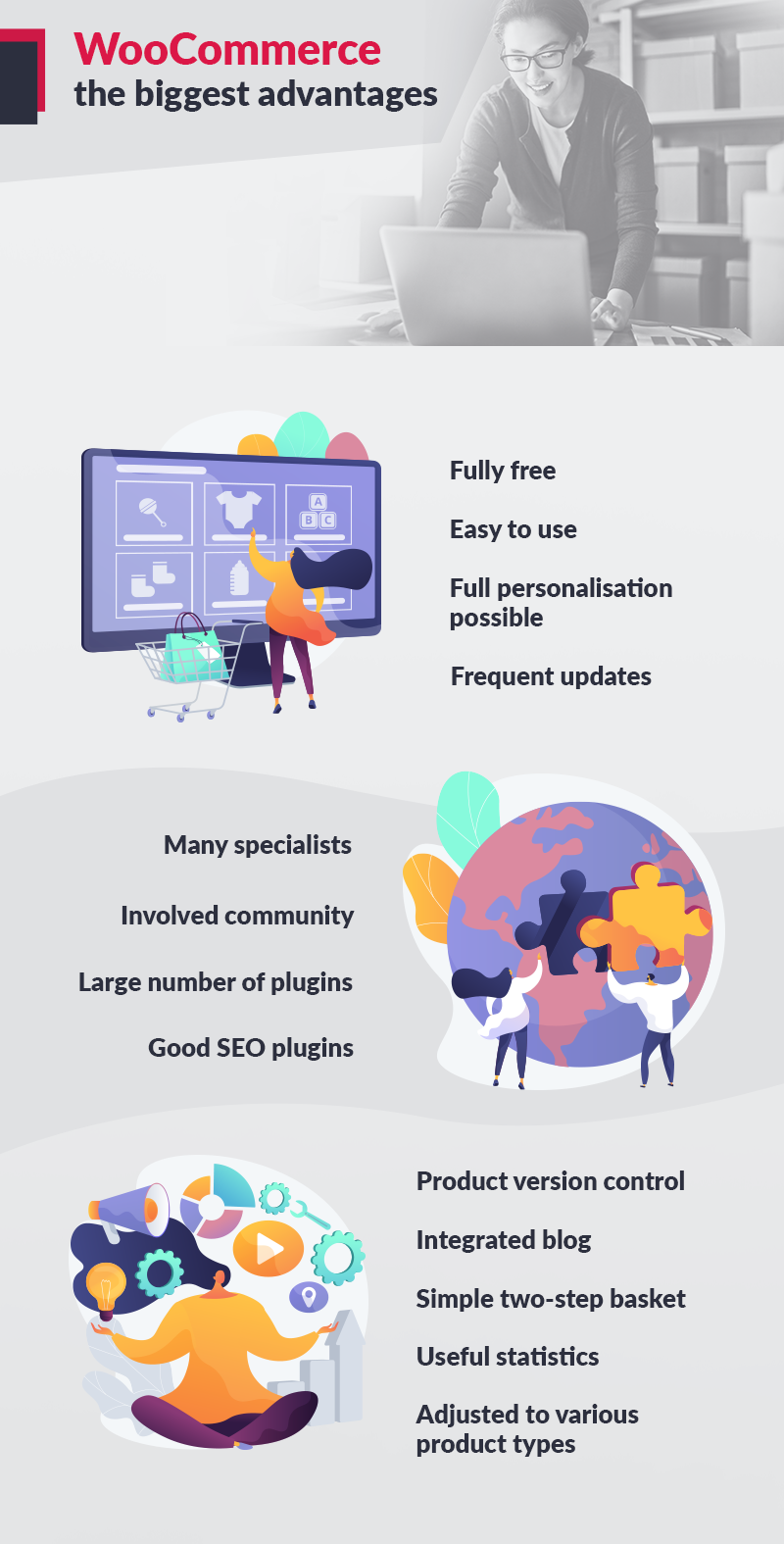
Source: WhitePress Graphics Development.
Summary: is it worth considering WooCommerce?
Like any software, WooCommerce has its pros and cons. It really depends on the project that you are working on. If you choose an Open Source solution, it's best to test the software before making the final choice. Learning how to use the panel is not a difficult task but there is an issue related to the ease of use and integration. Although it is a free software solution, you must have funds to maintain the shop. Thanks to WooCommerce and all Open Source solutions, the threshold for entering e-commerce is definitely lower and simpler.

























